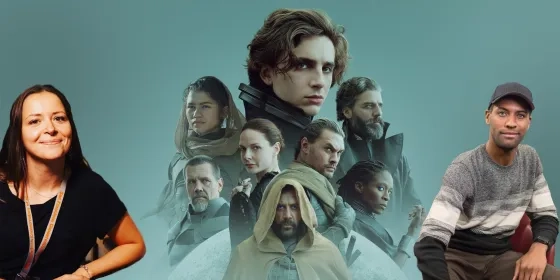Sound and Sand: Breaking Down the 'Dune' Soundtrack
Sci-fi thriller 'Dune' has created a sandstorm in sales at the box office, but its film scoring is also getting a lot of attention. The SFCM newsroom sits down with two composers and SFCM TAC faculty to break down its unique soundtrack.
Otherworldly, unorthodox, and provocative—just some of the words used to describe the soundtrack of the new movie Dune by legendary composer Hans Zimmer. The new film adaptation of the famous sci-fi novel has become a blockbuster hit, and its film score is garnering attention for the large part it played in storytelling on the planet Arrakis, the infamous spice, and overall interstellar drama.
In a conversation Technology and Applied Composition professors Kris Grant and Daria Novoliantceva analyze the soundtrack, explain the role a film score plays in storytelling, and what all musicians can learn from this composition.
SFCM: The Dune score from Hans Zimmer is getting a lot of attention: Why is that?
Grant: It was a great compliment to an excellent film. The sounds were fresh and enigmatic, and Zimmer decided to go in a different direction than his usual blockbuster style a la Interstellar or Inception.
Novoliantceva: I think because the overall production is excellent, and the picture itself looks very special, like we are actually looking to another world. Everything in this movie looks, sounds, and feels extremely unique and real.
What did you think of the film score overall?
Grant: I thought it was great! I really liked the emphasis on big synthetic textures and unnatural sound design; I think the focus on rhythms and soundscapes over tonal melodic content did well to emphasize the barren and ultimately dangerous landscape of Arrakis. My favorite songs from the soundtrack would have to be "Ripple in the Sand" and "Sandstorm."
Novoliantceva: I think it is a great movie, I would give it a 9.5 score, it felt just a bit too long for me. The story is complicated, so for the first 30 minutes I couldn’t understand what’s going on. But then the story captivated my imagination.
How would you describe it?
Grant: I would describe it as intense and ethereal. Zimmer hit the nail on the head for setting the tone; It sounded like how walking through an immense desert must feel. The subtler moments acting as a brief respite from a crescendoing sand storm. The sparse tonal elements also did a great job conveying the sci-fi theme as well with dense, awe-inspiring chord stacks and effervescent arpeggios.
Novoliantceva: I would describe it as unique, astonishing, something that you would not imagine.
What makes this film score unique?
Grant: I think partly the lack of extensive major melodic thematic content made it very memorable. Usually, when I think of a film score, I think of a particular tune or melody. With this score, however, it felt much more like the sound design choices were the various themes. There were slight similarities that appeared throughout a few songs, but most of the magic to me was in the individual sound design decisions.
Novoliantceva: The score consists of very different instruments, from different time periods and different natures. Such as the Armenian duduk, a very ancient woodwind, and choir singing aleatoric techniques from the end of 20th century, and contemporary synths and sound design.
The sound palette overall is eclectic and yet very well blended. It sounds like a big unique new hybrid orchestra. Another thing is that music works very well with sound design in the movie. Everything works like it belongs to the same universe.
Film score analysts have called it "Unorthodox" and "Provocative." What do they mean by this?
Grant: An interesting thing to note is that a lot of it would be difficult to accurately score on sheet music, as the musical decisions were largely dependent on the sound design choices and not necessarily on the melodic composition. That is not to say that it couldn’t be engraved, however it would probably not sound quite as grandiose on a piano.
Novoliantceva: There is a mix of very different sounds and techniques. The music blows your mind during the whole movie. You don’t expect this to be that impactful.
What can composers learn from this kind of film scoring?
Grant: Embrace electronics! Synthesizers don’t always have to sound dancey or uncontrollable and can convey just as much nuance and emotion as traditional instruments. Also, thoughtful layering can greatly enhance the texture of a synth or electronic component, so don’t be afraid to stack those synths together for a nice, full sound.
Novoliantceva: Be brave choosing sounds for composition, try new things, try mixing unexpected sounds. And of course the soundtrack works very well with the picture, it helps telling the story in a very dramatic way.
How important is film scoring to storytelling?
Grant: Extremely! Music is a narrative tool like any other visual part of a film. It can help set the tone for a scene and greatly enhance (or even detract from, if we aren’t careful) the drama on the screen
Novoliantceva: Music can change the perspective of a scene in a movie, it can make the audience feel any kinds of emotions.
You can see Dune in theaters and streaming on HBO Max. Grant and Novoliantceva both recommend seeing it in IMAX or a Dolby movie theater to experience the full range of music and sound.
Learn more about studying Technology and Applied Composition at SFCM.
